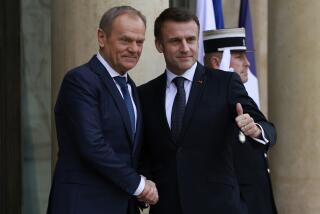Will All Europeans Have the ‘Right’ to Live in Paris?
- Share via
NEW YORK — Last week, the leaders of the 15 members of the European Union gathered in Amsterdam and confirmed what we already knew: After celebrating its 40th birthday just one month ago, the European Union is in the middle of a messy midlife crisis.
The most obvious problem, of course, is EMU or European Monetary Union--Europe’s ambitious but impractical proposal to unite 15 separate national currencies into the “euro.”
Keep dreaming. As the deadline for monetary union approaches, it becomes clearer and clearer that Europe isn’t ready. With high unemployment, hefty taxes, slow growth and stubborn deficits, Europe’s major powers simply can’t meet the tight debt and deficit targets they all agreed to four years ago.
Now they are squabbling about what to do. The French want grade inflation: Since nobody qualifies under the old criteria, let’s give everybody, including Italy, a pass. German public opinion and the powerful Bundesbank would rather delay the project than give social promotions into EMU, but Helmut Kohl, the longest-ruling German chancellor since Otto von Bismarck, has staked his political future on keeping to the schedule.
Yet, bad as all this is, most economists believe that the euro will be more trouble to live with than to build. The European Central Bank, which will be in charge of the new currency, will have the impossible job of setting a single interest rate for the EU to ensure stable prices, full employment and steady economic growth across the continent.
“And why not?” say Euro-optimists. If the Federal Reserve can set policy for the whole United States, why can’t the European Central Bank do the same in the EU?
The answer is: The United States is different. In America, when one part of the country is in recession, we get in our cars and follow the jobs--17% of Americans move every year, and almost half of them move to a new state. Moreover, federal spending on unemployment and food stamps transfers money from prosperous regions to poorer ones.
That isn’t going to happen in Europe. The French won’t move to Finland no matter how many Kinkos open in Helsinki. In Europe, the welfare system is national; if French unemployment goes up, Germany doesn’t help pay the welfare bill.
The result, almost certainly, will be a chaotic mess. Possibly the euro, and even the EU will break up. Even if the euro survives, much of the European Union will be condemned, long term, to slow growth and high unemployment.
Either way, the United States gets hurt. If Europe grows slowly, it can’t buy as many imports. That is bad news for U.S. producers; it is also bad news for U.S. trade negotiators. When countries like China and Japan can’t sell to Europe, they will work harder to run up trade surpluses with the United States.
The United States also needs a strong and prosperous EU to bring Eastern and Central Europe into the Western economic family. The EU’s expansion eastward will guarantee Eastern Europe’s stability and growth at little or no direct cost to the U.S. If the euro sends the EU into a funk, expansion will be postponed, maybe canceled. Look for new instability across Eastern Europe--and wait for the piteous calls from Poland and places like Slovenia and Slovakia for a new multibillion-dollar “Marshall Plan” from America to get them going again.
Unfortunately, if the headline story at Amsterdam was the crisis in the EU’s project for monetary union, the second-biggest story was the crisis in the EU’s plans for eastward expansion. Expanding the EU into Eastern Europe is going to be harder than bringing Mexico into the North American Free Trade Agreement. Not only do Eastern Europeans earn one-tenth the wages of German workers, the citizens of every EU country have the right to immigrate to any other EU country, where they can settle, collect welfare and vote in local elections. EU expansion means every unemployed ne’er do well in Eastern and Central Europe will have the legal right to move to Paris.
This is only the start. Only Rube Goldberg could draw an organization chart of the EU as it now exists. On important questions, every country has a veto. The European Commission, with two members from each of the larger countries and one member from the smaller ones, is a bureaucratic monstrosity. Adding more members means adding more commissioners. If five new members join, only sweeping reforms in the voting procedures and European Commission will make the EU workable--and at Amsterdam, progress on those reforms looked far away.
What seems to have happened is the EU made a serious error after 1989. Confronted with a choice of adding new eastern members after the collapse of the Soviet Union or of honing its institutions to form a more perfect union first, the EU, in essence, chose to put monetary union ahead of expansion.
One reason, frankly, was anti-Americanism. The French, in particular, see the EU as a way to build a coalition that can challenge the U.S. on equal terms. Afraid that a larger EU could never deepen, the French and Germans decided to go full speed ahead toward monetary union, with results that are all too evident.
Both the Bush and Clinton administrations missed the boat. Washington had and has a clear interest in the widening of the European Union. Widening stabilizes Eastern Europe; deepening the European Union is a quixotic policy that probably won’t work and would, from the U.S. point of view, be bad if it did.
However, the United States has allowed itself to be frozen out of the European debate. In Amsterdam, Europeans debated the most important problems their continent faces, but the United States wasn’t part of the conversation. That’s normal these days. The United States gets called in when there is a danger of bloodshed, as in Bosnia, but the EU isn’t interested in U.S. ideas about the growth of Europe’s key institutions.
This is largely Washington’s fault. Expansion of the North Atlantic Treaty Organization, from the EU point of view, is a bone to throw Eastern Europe until the EU is ready to think about expansion. If the United States wanted leverage in the European debate, the way to get it would be to condition NATO expansion on EU expansion. That would force the EU to arrange its priorities in the right order, help Eastern Europe, preserve U.S. interests and, in the long run, be the best policy for European integration.
That the State Department obsesses about NATO expansion while the EU makes a hash of its future is a sign of the intellectual bankruptcy of U.S. policy in Europe. That’s too bad for Washington and for them--the Europeans need us badly as they sink deeper and deeper into their Maastrichtian swamp.
More to Read
Inside the business of entertainment
The Wide Shot brings you news, analysis and insights on everything from streaming wars to production — and what it all means for the future.
You may occasionally receive promotional content from the Los Angeles Times.










